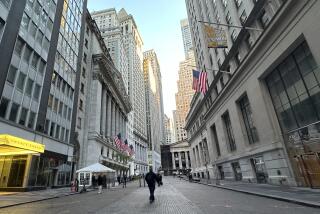Economic Indicators Gain After Two-Month Decline : 1.1% Rise Called âGood, Not Greatâ Improvement
WASHINGTON â The governmentâs main gauge of future economic health rose a strong 1.1% in July after two months of decline, providing what one analyst called âgood but not greatâ news for the sluggish economy.
The gain in the forward-pointing Index of Leading Indicators announced by the Commerce Department today was bigger than most private economists had expected.
However, the report also revised Juneâs index sharply downward--from a 0.3% increase to a 0.4% decline--perhaps making the July increase look misleadingly large by comparison.
Big Jump Offset
âItâs good but not great,â said David Wyss, chief financial economist for Data Resources Inc. in Lexington, Mass. âThe downward revision of June just about offsets the big jump in July.â
Lawrence Chimerine, president of Chase Econometrics in Bala Cynwyd, Pa., also saw little reason for cheering.
âThis is consistent with the general pattern we have been seeing,â he said. âThe economy isnât getting any worse. It is growing very slowly and there is no evidence that this pattern is changing.
âWe would need several more months of significant increases and more widespread gains in the components to indicate the economy was accelerating.â
Private analysts have no doubt that the U.S. economy is growing more rapidly in the July-September quarter than the barely visible 0.6% annual rate of the April-June quarter.
Growth Predicted
However, most are predicting growth the rest of this year and in early 1987 at a 2.5% to 3% rate--roughly the same as the modest pace of the last two years and well below the 4% growth forecast by the Administration.
The recent sluggishness has not increased the national unemployment rate or set off other warnings that a new recession might be imminent. However, the slow rate of economic expansion has disappointed business leaders and government officials, who had gotten used to much faster growth in the first 18 months of recovery after the 1981-82 recession.
The Index of Leading Indicators, a compilation of 11 forward-pointing figures from various areas of the economy, was given its biggest push upward in July by substantial increases in the money supply and in the rate of new business formation.
Positive Indicators
Other positive indicators included slower business deliveries and higher raw materials prices--both indicative of a business pickup--an increase in contracts and orders for new plant and equipment, a rise in outstanding credit and a decrease in initial unemployment claims.
Negative indicators included declines in stock prices, building permits and new orders for consumer goods and materials, while there was no change in the average work week.
Wyss said two of the negatives have or soon will become positives: stock prices, which are rising again, and building permits, which he said should increase as home loan rates decline.
The report said the biggest reason for the overall June revision from a positive to a negative index number was a big drop in business inventories on hand and on order. The figure had been unavailable when the June report was compiled.
The May decline of 0.1% was unchanged from the previous report, but the April gain of 1.2% was revised down slightly from 1.3%.
More to Read
Inside the business of entertainment
The Wide Shot brings you news, analysis and insights on everything from streaming wars to production â and what it all means for the future.
You may occasionally receive promotional content from the Los Angeles Times.










